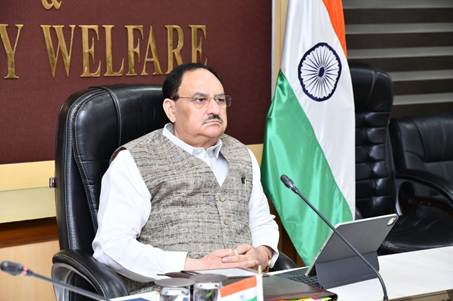Union Health Minister Jagat Prakash Nadda on Thursday convened a high-level meeting, ‘Kayakalp Manthan’, bringing together senior officials, representatives from Central Government hospitals, NGOs, and healthcare experts from the Ministry of Health and Family Welfare. The meeting aimed to enhance public healthcare delivery and promote deeper community engagement in improving the quality and accessibility of health services across the country.
The discussion focused on reinvigorating the Kayakalp Scheme, a national initiative launched in 2015 to promote cleanliness, hygiene, and infection control across public healthcare institutions. Over the last decade, the scheme has grown substantially—from 10 Central Government hospitals to 25, with extended implementation across State Government hospitals through the National Health Mission (NHM).
Addressing the gathering, Nadda acknowledged the progress achieved under the scheme but emphasized the need for sustained efforts and innovation to further enhance healthcare delivery. He stated, “Evolving towards a patient-centric ecosystem is critical for meeting the ever-increasing expectations of public service delivery.”
The Health Minister highlighted the importance of hospital environment and ambiance in improving patient experience. He noted that while clinical care is often commendable, gaps in communication and patient engagement often leave room for dissatisfaction. “Thousands visit government hospitals every day and receive quality treatment, yet their feedback often lacks positivity. This calls for deeper introspection and a more empathetic approach in healthcare delivery,” he added.
Nadda stressed the need for continuous capacity building, regular reviews, and robust enforcement mechanisms to maintain high-quality standards across all healthcare institutions. He urged stakeholders to work on the image and perception of government hospitals by addressing infrastructure, cleanliness, staff behavior, and amenities.
A key focus of the Manthan was Jan Bhagidari—the involvement of local communities in managing healthcare facilities. “Creating a sense of ownership and belonging among the people is crucial to improving service delivery under the Kayakalp Scheme. It must evolve into a nationwide movement,” the Minister asserted.
In response to the increasing burden on premier institutions in Delhi and other metros, Nadda called for a stronger focus on grassroots-level facilities, including Sub-Health Centres. He emphasized the importance of training, capacity building, technological integration, and eco-friendly innovations to decentralize care and reduce strain on urban hospitals.
“Kayakalp is not just a cleanliness initiative. It represents a transformation in how healthcare services are delivered, conceived, and executed,” the Health Minister added.














